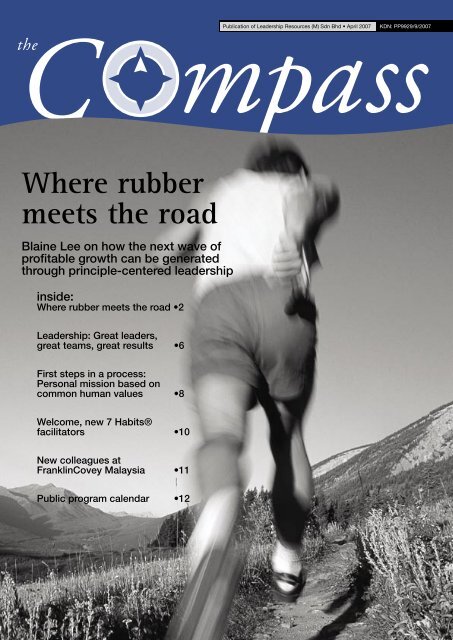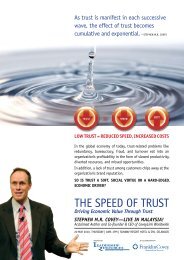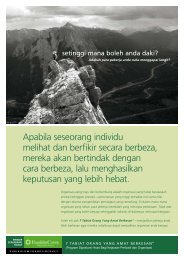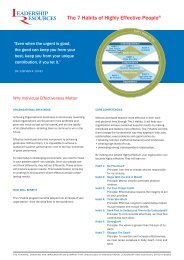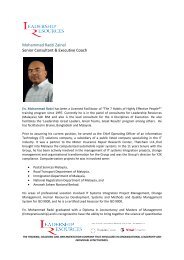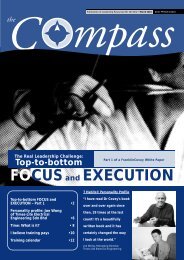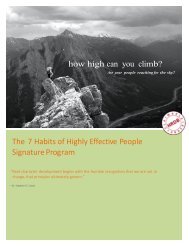Where rubber meets the road
April 2007 - Leadershipresources
April 2007 - Leadershipresources
You also want an ePaper? Increase the reach of your titles
YUMPU automatically turns print PDFs into web optimized ePapers that Google loves.
Publication of Leadership Resources (M) Sdn Bhd • April 2007<br />
KDN: PP9929/9/2007<br />
<strong>Where</strong> <strong>rubber</strong><br />
<strong>meets</strong> <strong>the</strong> <strong>road</strong><br />
Blaine Lee on how <strong>the</strong> next wave of<br />
profitable growth can be generated<br />
through principle-centered leadership<br />
inside:<br />
<strong>Where</strong> <strong>rubber</strong> <strong>meets</strong> <strong>the</strong> <strong>road</strong> •2<br />
Leadership: Great leaders,<br />
great teams, great results •6<br />
First steps in a process:<br />
Personal mission based on<br />
common human values •8<br />
Welcome, new 7 Habits®<br />
facilitators •10<br />
New colleagues at<br />
FranklinCovey Malaysia •11<br />
Public program calendar •12<br />
<strong>the</strong> Compass: April 2007 • 1
<strong>Where</strong> <strong>rubber</strong> <strong>meets</strong><br />
<strong>the</strong> <strong>road</strong><br />
Today’s business environment<br />
is marked by turbulent and<br />
unpredictable change. The C-suite<br />
and senior management team<br />
members are under increasing<br />
pressure to deliver on greater and<br />
growing demands.<br />
netv@lue2.0 caught up with<br />
Dr Blaine N Lee, senior executive<br />
advisor and founding vice-president<br />
By Malar Ramalingam<br />
2 • <strong>the</strong> Compass: April 2007
of FranklinCovey Inc, to find out how <strong>the</strong> next wave of<br />
profitable growth can be generated through principlecentered<br />
leadership, coupled with an intense focus on<br />
business execution.<br />
Says Lee: “As a life coach, I often get asked, ‘How do I get <strong>the</strong><br />
customers to come when <strong>the</strong>re is no ‘Sale’? How do we get our employees<br />
to do what we want <strong>the</strong>m to do? How do we get our children<br />
to clean <strong>the</strong>ir rooms?”<br />
According to him, <strong>the</strong> wrong questions are being asked. The<br />
questions should be: “Why should <strong>the</strong>y listen to you? Why should<br />
<strong>the</strong>y follow you? Why should <strong>the</strong>y do what you want?’”<br />
“Mo<strong>the</strong>r Teresa, Gandhi, Martin Lu<strong>the</strong>r King Jr. – <strong>the</strong>se leaders<br />
did not say; ‘How do I get people to follow me?’ They lived by <strong>the</strong>ir<br />
principles and people were attracted to that. Thus, it is really <strong>the</strong><br />
characteristics and attributes you have that make you <strong>the</strong> kind of<br />
person o<strong>the</strong>rs will believe in and want to follow,” Lee declares.<br />
What is <strong>the</strong> difference between<br />
principle and values-based<br />
leadership here?<br />
Everybody has values. Hitler.<br />
Saddam Hussein. You and I. Values<br />
are more personal, more subjective.<br />
Principles are universal, external,<br />
objective and culture free.<br />
For example, some believe that<br />
you should have a good time now<br />
while you still have your health.<br />
O<strong>the</strong>rs might say that while you still<br />
have your health, you should give<br />
service to mankind. These are two<br />
different views but which one is<br />
right? I don’t know. Those are just<br />
different values held by individuals.<br />
Principles, on <strong>the</strong> o<strong>the</strong>r hand, are<br />
like gravity. If you were to jump off<br />
a building, you would fall. Whe<strong>the</strong>r<br />
or not you understand it, it will still<br />
apply.<br />
What we discovered among <strong>the</strong><br />
world’s best leaders is that <strong>the</strong>ir values<br />
are closely aligned with principles.<br />
People of all ages and cultures<br />
have lived <strong>the</strong>ir lives with a purpose.<br />
They have had some worthy<br />
goal <strong>the</strong>y were striving for. That is<br />
a principle of effectiveness. What<br />
we invite people to do is to consider<br />
to what extent <strong>the</strong>ir values overlap<br />
<strong>the</strong>se timeless principles.<br />
Very often, we see a gap between<br />
goals of personal and<br />
team effectiveness. Why is this?<br />
After 9/11, we saw a whole new<br />
world. Individuals were still effective<br />
but organizations were not<br />
meeting <strong>the</strong>ir goals. So, we went<br />
to <strong>the</strong> ground to find out where <strong>the</strong><br />
<strong>rubber</strong> was not meeting <strong>the</strong> <strong>road</strong>.<br />
Here’s what we discovered:<br />
• People didn’t know <strong>the</strong> goals<br />
of <strong>the</strong>ir organization;<br />
• If <strong>the</strong>y knew about <strong>the</strong> goals,<br />
<strong>the</strong>y didn’t care about <strong>the</strong>m;<br />
• If <strong>the</strong>y did care about <strong>the</strong>m,<br />
<strong>the</strong>y didn’t know what <strong>the</strong>y<br />
were supposed to do to make<br />
it happen;<br />
• And if <strong>the</strong>y knew that, <strong>the</strong>re<br />
was no scoreboard or measures<br />
to tell <strong>the</strong>m if <strong>the</strong>y were<br />
winning or losing;<br />
• And finally, <strong>the</strong>re was no accountability.<br />
So, we developed a program that<br />
is a synergistic blend of disciplines<br />
and, more importantly, it involves<br />
things people can learn to do.<br />
We started coaching people<br />
to clarify goals throughout <strong>the</strong>ir<br />
organization and develop measures<br />
so everyone knows how <strong>the</strong>y are<br />
doing. Then, we worked with <strong>the</strong>m<br />
on how <strong>the</strong>y could build reinforcement<br />
and encouragement so that<br />
people will want to do those things.<br />
This was followed by setting guidelines<br />
to help people be accountable.<br />
Finally, we added <strong>the</strong> importance<br />
of celebrating accomplishments of<br />
those goals and how to consistently<br />
revisit <strong>the</strong>se practices year after year<br />
so that <strong>the</strong>y develop a culture of execution<br />
– making it not just a place<br />
to work but a place <strong>the</strong>y get results.<br />
What o<strong>the</strong>r key elements of<br />
human nature should a principlecentered<br />
leader balance?<br />
You have a body that you must take<br />
care of. This is called <strong>the</strong> economic<br />
model. People have financial needs.<br />
They need a roof over <strong>the</strong>ir heads,<br />
clothing and food. The principle<br />
here is that you need to treat people<br />
fairly. If you don’t, <strong>the</strong>y may leave<br />
or find ways to sabotage you.<br />
But that’s not <strong>the</strong> only reason<br />
people work. People also have<br />
hearts. They want to be treated<br />
kindly, with dignity and respect.<br />
Now this is <strong>the</strong> human relations<br />
paradigm where <strong>the</strong> more enlightened<br />
would say, ‘I am not just going<br />
to pay you fairly but I am going to<br />
treat you well.’ These are companies<br />
with paternity leave and o<strong>the</strong>r<br />
benefits like investment plans.<br />
The next is <strong>the</strong> mind or mental<br />
capability element. Use me well and<br />
help me grow. This human resource<br />
paradigm developed in <strong>the</strong> 1980s.<br />
And finally, <strong>the</strong> spiritual level.<br />
The practice of principle-centered<br />
leadership where we do all of <strong>the</strong><br />
above and also ask, ‘What is your<br />
contribution? Why are you doing<br />
what you are doing? What difference<br />
will you make?’ This is where<br />
one can leave a legacy.<br />
<strong>the</strong> Compass: April 2007 • 3
Glowing<br />
testimonials<br />
Blaine N Lee was in KL recently as <strong>the</strong> main<br />
presenter in a three-day workshop on Principle-<br />
Centered Leadership®. We spoke to <strong>the</strong><br />
following people whose names were provided<br />
by <strong>the</strong> organizers on <strong>the</strong>ir takeaway from <strong>the</strong><br />
workshop.<br />
Phee Chiew Tee, head of division (commercial),<br />
United Overseas Bank (M) Bhd<br />
A very helpful program. It clearly highlighted <strong>the</strong> importance<br />
of leading by example. It is behavioral patterns that inspire<br />
<strong>the</strong> necessary changes to cope with market demands today.<br />
Fernando Spinelli, technical director,<br />
SCA Hygiene Malaysia Sdn Bhd<br />
One of <strong>the</strong> challenges we face today is maintaining our<br />
technological advantage. Although we have a strong R&D<br />
practice and our company goals are clearly understood<br />
by all our staff and translated well into action, it is getting<br />
increasingly difficult to anticipate and manage changes in<br />
technology as well as markets.<br />
I found this program really good. It helped me cope better<br />
with <strong>the</strong>se changes both at work and on a personal level. I<br />
discovered <strong>the</strong> importance of balance in leadership. It is<br />
not enough just to be good at projecting market needs; one<br />
must also be able to balance <strong>the</strong> role of leader in pathfinding,<br />
aligning, empowering and modeling. Only <strong>the</strong>n can we satisfy<br />
our customers’ rising expectations.<br />
Goiancarlo Maccagno, executive director,<br />
Wah Seong Corp Bhd<br />
I was drawn to <strong>the</strong> title of <strong>the</strong> course. Leadership, as we<br />
know, is made up of two parts –competency and character.<br />
I personally believe that character is what can make a big<br />
impact on not just our organization but <strong>the</strong> world we live in as<br />
well. It’s more than just business. We are affecting <strong>the</strong> lives<br />
of people – our families, our colleagues and people around<br />
us.<br />
I was reminded about <strong>the</strong> importance of honor and integrity.<br />
Many companies have <strong>the</strong>se in our mission statements but<br />
it’s really important to truly live it. If you live it, it will show<br />
and you will inspire people and lead better.<br />
In my organization, we need to step out of our day-to-day<br />
operations and find our leaders. We need to find <strong>the</strong> talent<br />
within or bring it in, and grow <strong>the</strong>m to handle challenges and<br />
not do it all ourselves. We need to empower our people.<br />
4 • <strong>the</strong> Compass: April 2007
From <strong>the</strong> point of <strong>the</strong> C-suite, how can caring so much for <strong>the</strong>ir<br />
employees guarantee growth for <strong>the</strong> organization?<br />
Every company is naturally concerned with market share and profitability.<br />
Customers are very important to <strong>the</strong> existence and growth of <strong>the</strong> business.<br />
Who takes care of those customers? I never met a CEO who was out fixing<br />
television sets or mowing lawns. Your employees are doing that. So, have<br />
goals around taking care of <strong>the</strong>m.<br />
You also need to have superior business performance but that isn’t<br />
enough today. Truly great companies have at least four measures:<br />
• Superior financial performance – <strong>the</strong>y are market leaders;<br />
• Absolutely loyal customers who prefer doing business with <strong>the</strong>m<br />
even in difficult times;<br />
• Fully engaged employees – people are not leaving and <strong>the</strong> firm is<br />
receiving great returns on its training costs;<br />
• Making a distinct contribution – if this company didn’t exist, someone<br />
else would need to create one.<br />
Thus, principle-centered leadership looks into individual leadership<br />
greatness as well as sustainable team performance in making <strong>the</strong> above<br />
happen.<br />
Can you give us an example of an organization with low morale and<br />
poor corporate governance that was turned around by employing<br />
principle-centered leadership?<br />
Southwest Airlines of <strong>the</strong> US – it is a small regional airline and is now more<br />
profitable than any o<strong>the</strong>r airline. It also has better customer service and<br />
more on-time departures.<br />
If a principle-centered leader does decide to stay and make things<br />
happen, what are <strong>the</strong> elements that need to be put in place?<br />
Understand that most people are not proactive. They’ll look after <strong>the</strong> environment<br />
you create. Many, when faced with challenges, often cave in and<br />
give up <strong>the</strong>ir values. However, 75% to 90% of <strong>the</strong> time, you can make a<br />
difference where you are. And it is a principle-centered leader who will say,<br />
‘We can do more, we can do better, let’s go for it.’<br />
First, make it safe or your people are not going to try. They’re going to<br />
stay in <strong>the</strong>ir protective shells. Second, show <strong>the</strong>m how because <strong>the</strong>y may<br />
not know. Third, invite <strong>the</strong>ir commitment. Ask <strong>the</strong>m if <strong>the</strong>y will be willing<br />
to try.<br />
In fact, <strong>the</strong>se are <strong>the</strong> principles, I, a Utah born and bred fa<strong>the</strong>r of 12 and<br />
grandfa<strong>the</strong>r of 27, live by. After years of conducting leadership programs<br />
for <strong>the</strong> US Air Force, teaching at school for teens at risk, lecturing and<br />
speaking at several universities, consulting for <strong>the</strong> likes of Stephen Covey<br />
and Oprah Winfrey, and many o<strong>the</strong>r corporate figures, I have always let my<br />
mission statement guide me: To help o<strong>the</strong>rs find hope by being true to <strong>the</strong><br />
‘light’ <strong>the</strong>y already have.<br />
Once people are aligned both inside and out, <strong>the</strong>y will gain confidence<br />
to go for whatever <strong>the</strong>y want and make a true contribution to <strong>the</strong> world<br />
This article appeared in <strong>the</strong> October 9, 2006 issue of netv@lue2.0, <strong>the</strong> pullout section of The<br />
Edge. For more information regarding Dr Blaine Lee’s forthcoming Principle-Centred Leadership®<br />
workshop on May 14-16, 2007, please contact us at 03-79551148.<br />
<strong>the</strong> Compass: April 2007 • 5
L E A D E R S H I P<br />
Great Leaders • Great Teams • Great Results<br />
NO CLEAR<br />
PURPOSE OR VISION<br />
TALENT AND POTENTIAL<br />
UNDERUTILIZED<br />
Four Chronic Organizational<br />
and Team Problems<br />
LOW TRUST<br />
in a global knowledge<br />
economy, <strong>the</strong> source of<br />
highest value is <strong>the</strong> creative<br />
engagement of <strong>the</strong><br />
whole person: body, heart, mind<br />
and spirit. However, most of our<br />
organizational and management<br />
practices are based on <strong>the</strong> industrial<br />
model where people are treated<br />
as things. Even though we may<br />
agree intellectually to <strong>the</strong> value created<br />
by unleashing <strong>the</strong> full creative potential of<br />
people, our practices do not reflect that. We<br />
are still trapped in an industrial age.<br />
Some of <strong>the</strong> challenges leaders face today include :<br />
1. Building trust & influence with o<strong>the</strong>rs<br />
2. Defining team’s purpose and <strong>the</strong> “job to be done”<br />
3. Creating a strategic link between <strong>the</strong> work of <strong>the</strong> team and <strong>the</strong> goals<br />
of <strong>the</strong> organization<br />
4. Connecting <strong>the</strong> work of <strong>the</strong> team to <strong>the</strong> organization’s economic<br />
model<br />
Great leaders have <strong>the</strong> mind-set, skill-set and tool-set necessary to unleash<br />
<strong>the</strong> highest talent and capability of people against <strong>the</strong> organization’s<br />
most important priorities. You see people as “whole persons” – it means you<br />
recognize that <strong>the</strong> highest contributions are volunteered each day by people<br />
who could easily choose to go elsewhere. As a result, you spend your<br />
efforts creating a place where people want to stay and in which <strong>the</strong>y are<br />
enabled to offer <strong>the</strong>ir best.<br />
The key to <strong>the</strong> big is <strong>the</strong> small. Great leaders recognize that large things<br />
are accomplished by consistently doing <strong>the</strong> right smaller things over time.<br />
BUREAUCRATIC,<br />
MISALIGNED SYSTEMS<br />
6 • <strong>the</strong> Compass: April 2007
Just as a small trim tab on <strong>the</strong> rudder of a large ship determines <strong>the</strong> direction<br />
of <strong>the</strong> ship, small things done consistently over time can have tremendous<br />
impact.<br />
Great leaders practice <strong>the</strong> skill-set and tool-set required to unleash people’s<br />
highest contribution toward meaningful organizational purposes.<br />
The 4 Imperatives of Great Leaders<br />
1. Inspire trust among direct reports, superiors and peers<br />
2. Clarify purpose by articulating why goals are<br />
established and how individual work contributes<br />
to those goals<br />
3. Align systems and work processes<br />
so <strong>the</strong>y facilitate ra<strong>the</strong>r than<br />
hinder achievement<br />
4. Unleash <strong>the</strong> unique talents<br />
and contribution of people<br />
on <strong>the</strong>ir teams<br />
CLARIFY<br />
PURPOSE<br />
The 4 Imperatives of<br />
Great Leaders<br />
Leadership : Great Leaders, Great Teams,<br />
Great Results is FranklinCovey’s<br />
flagship leadership development program.<br />
It takes a “ mind-set, skill-set, tool-set”<br />
approach to developing leaders who can<br />
unleash <strong>the</strong> talent and capability of <strong>the</strong>ir<br />
team against <strong>the</strong> organization’s highest<br />
priorities. Call us at 03-79551148 to find<br />
out more about our next workshop on<br />
May 8-10, 2007.<br />
UNLEASH<br />
TALENT<br />
INSPIRE TRUST<br />
ALIGN<br />
SYSTEMS<br />
IMPERATIVES PURPOSE WHAT GREAT LEADERS DO…<br />
Imperative 1:<br />
Inspire Trust<br />
Imperative 2:<br />
Clarify Purpose<br />
Imperative 3:<br />
Align Systems<br />
Imperative 4:<br />
Unleash Talent<br />
To build credibility as a leader, so that people<br />
will trust you with <strong>the</strong>ir highest efforts.<br />
To define a clear and compelling purpose so<br />
that people will want to offer <strong>the</strong>ir best<br />
to achieve<br />
To create systems of success that support<br />
<strong>the</strong> purpose and goals of <strong>the</strong> organization,<br />
enable people to do <strong>the</strong>ir best work, operate<br />
independently of you, and endure over time.<br />
To develop a winning team, where people’s<br />
unique talents are leveraged against clear<br />
performance expectations in a way that<br />
encourages responsibility and growth.<br />
I get things done through personal<br />
influence and credibility (informal or moral<br />
authority)<br />
If a clear and compelling purpose exists,<br />
people will volunteer <strong>the</strong>ir best efforts.<br />
Enduring success is in <strong>the</strong> systems<br />
My job is to release <strong>the</strong> talent and<br />
passion of our team toward our highest<br />
priorities.<br />
<strong>the</strong> Compass: April 2007 • 7
PROCESS:<br />
Personal mission based on<br />
common human values<br />
By Dr. D. H. (Dee) Groberg<br />
Try this exercise that we do in a 7 Habits® workshop<br />
to begin <strong>the</strong> process of creating a personal mission<br />
statement. It forms a foundation, upon which you<br />
can begin <strong>the</strong> process of creating your future, what<br />
you really want to be.<br />
We have participants start with a blank sheet of paper<br />
and answer this question for <strong>the</strong>mselves: “What<br />
things matter most to me?” They make a list of six<br />
or eight items. (“Things” may be abstract.) Next<br />
<strong>the</strong>y narrow <strong>the</strong> list down to three. In o<strong>the</strong>r<br />
words, <strong>the</strong>y ask this question, “What three<br />
things matter most to me?”<br />
When I have done this with large groups<br />
of people at workshops, I ask <strong>the</strong>m to take<br />
one more step with <strong>the</strong>ir list. I have <strong>the</strong>m get<br />
in three-person groups, share <strong>the</strong> three items<br />
that matter most to <strong>the</strong>m with <strong>the</strong> o<strong>the</strong>r two<br />
people in <strong>the</strong> group, and <strong>the</strong>n discuss <strong>the</strong>m<br />
toge<strong>the</strong>r and see if <strong>the</strong>y can come up with<br />
three items that all three of <strong>the</strong>m agree are<br />
<strong>the</strong> most important to all three of <strong>the</strong>m.<br />
Their first reaction often is, “How can we<br />
agree, if I have different things?” But I ask<br />
<strong>the</strong>m to give it a try; to challenge <strong>the</strong> items.<br />
(Just a note: When you’re dealing with deeprooted<br />
values, <strong>the</strong> words often get in <strong>the</strong> way.<br />
Once you get beyond <strong>the</strong> words, and ask <strong>the</strong><br />
question, “Why do I want that?” “What’s <strong>the</strong><br />
genesis of <strong>the</strong> thought that tells me I want<br />
that?” You might be surprised that your items<br />
will be more similar than you think.)<br />
As Eknath Easwaran, an Indian philosopher,<br />
puts it, “The deeper we get <strong>the</strong> more<br />
clearly we shall see that our differences with<br />
o<strong>the</strong>rs are superficial, and that 99% of what<br />
8 • <strong>the</strong> Compass: April 2007
we are is <strong>the</strong> same for all.”<br />
Usually <strong>the</strong> three-person groups do end up agreeing<br />
on what matters most to <strong>the</strong>m. I <strong>the</strong>n capture<br />
<strong>the</strong>ir answers on a flip chart. Because <strong>the</strong>re are several<br />
three-person groups involved, I often have a long list<br />
something like this:<br />
• Continual growth.<br />
• Freedom.<br />
• Family. (Positive relationships)<br />
• Make Contributions.<br />
• Financial security.<br />
• Good health.<br />
• Career success.<br />
• Love and respect.<br />
• Peace of mind.<br />
• Principles.<br />
As I write <strong>the</strong>se down, people recognize that some of<br />
<strong>the</strong> words used by one group were just ano<strong>the</strong>r way of<br />
saying what <strong>the</strong>ir group had said. So we try to reduce<br />
<strong>the</strong> list down to just three. People are often surprised<br />
at how similar <strong>the</strong>y are.<br />
What’s amazing is that I’ve done this all over <strong>the</strong><br />
world with representatives from many different religious<br />
and cultural groups, and I always come up<br />
with very similar items. It’s almost as though <strong>the</strong>re’s<br />
something that binds us toge<strong>the</strong>r as human beings at<br />
<strong>the</strong> deepest level.<br />
This realization hit me when I was making a presentation<br />
in Russia. I did a similar exercise with <strong>the</strong><br />
group <strong>the</strong>re. I grew up in <strong>the</strong> 50’s and 60’s and saw<br />
<strong>the</strong> Russians as <strong>the</strong> enemy, <strong>the</strong> bad guys, <strong>the</strong> “commies.”<br />
When I asked <strong>the</strong>m what <strong>the</strong>y valued most, <strong>the</strong><br />
first words out of <strong>the</strong>ir mouths gave me a paradigm<br />
shift. They said “Our families.” Can you imagine <strong>the</strong><br />
paradigm shift I had? No longer did I see <strong>the</strong>m as <strong>the</strong><br />
bad guys, <strong>the</strong> enemy, or “commies.” Now I saw <strong>the</strong>m<br />
simply as fellow human beings with <strong>the</strong> same hopes,<br />
and needs and desires that I had.<br />
THREE BASIC HUMAN VALUES<br />
I have tried to capture <strong>the</strong> categories that people<br />
have come up with throughout <strong>the</strong> world. These are<br />
my words, not necessarily <strong>the</strong> words people give me.<br />
But I believe that almost everything that I have heard<br />
people say about <strong>the</strong>ir deepest values fits into <strong>the</strong>se<br />
categories:<br />
1. Family: I extend this to mean all relationships<br />
that are near and dear and important to us. It’s<br />
not limited to blood relatives. Some people<br />
extend family to include everyone. Like Gandhi.<br />
Once someone asked Gandhi’s wife, “How<br />
many children do you have?” She said she<br />
had four, but her husband had four hundred<br />
million. He considered all of India his family.<br />
Perhaps even <strong>the</strong> whole world. He once said,<br />
“I claim to be incapable of hating any being on<br />
earth. By a long process of prayerful discipline,<br />
I have ceased for over 40 years to hate<br />
anyone.”<br />
2. Freedom: This word might not come up so<br />
often, but it underpins <strong>the</strong> thoughts in many of<br />
<strong>the</strong> words. Look at how many things are really<br />
aspects of freedom: freedom to grow, to express<br />
ourselves, etc. Even <strong>the</strong> desire for health is an<br />
expression of freedom. If I do this exercise with<br />
relatively young people, <strong>the</strong>y don’t come up<br />
with health, because we don’t value health until<br />
we start to lose it. That is because it is <strong>the</strong><br />
freedom that we are losing. It is similar with<br />
financial security. Why do people want financial<br />
security? So <strong>the</strong>y can have <strong>the</strong> freedom to<br />
do <strong>the</strong> things <strong>the</strong>y want.<br />
3. Faith: I had a hard time coming up with a<br />
word for this last category so I just chose one<br />
to fit in with <strong>the</strong> first letters: “faith.” What I<br />
am trying to capture by this category is some<br />
aspect of <strong>the</strong> transcendent - a quest for something<br />
more than just <strong>the</strong> here and now. For<br />
example, <strong>the</strong> words “Peace of Mind,” “Principles”<br />
fit into this category.<br />
Even in <strong>the</strong> Soviet Union my interpreter, Victor, valued<br />
this. He was really bemoaning <strong>the</strong> Russian system, so<br />
I said, “Victor, you don’t seem to believe in anything;<br />
what do you believe in?” His response set me back.<br />
He said, “I’ve decided to believe in God.” I said, “Victor,<br />
I thought you were a<strong>the</strong>ists over here.” He said,<br />
“That’s what <strong>the</strong>y try to teach us, but I need something<br />
solid, unchangeable to believe in and I don’t think God<br />
would change policies as much as our leaders do.”<br />
It may be called by many different terms, but all<br />
over <strong>the</strong> world I find that <strong>the</strong>re’s something in this category;<br />
some sense of <strong>the</strong> transcendent. So, deep inside<br />
people I think that <strong>the</strong>re is something that cries out for<br />
more than just <strong>the</strong> here and now.<br />
In <strong>the</strong> 7 Habits® workshop we show participants<br />
how <strong>the</strong>y can build on <strong>the</strong>se common human values<br />
to create a powerful personal mission statement that<br />
makes <strong>the</strong>m more effective in all areas of <strong>the</strong>ir lives,<br />
and transfers to <strong>the</strong> increased effectiveness of <strong>the</strong><br />
organization<br />
FranklinCovey Malaysia associate consultant Dr Dee Groberg helps<br />
participants to harness <strong>the</strong> power of mission statements at our “7<br />
Habits of Highly Effective People®” (Signature Program) workshops.<br />
Dee’s next workshop will be on June 12-14. The program is also<br />
conducted by our experienced Malaysian facilitators. Please refer to<br />
our training calendar or contact us at 03-7955 1148 for more details.<br />
<strong>the</strong> Compass: April 2007 • 9
Welcome, new 7 Habits® facilitators<br />
The Compass congratulates <strong>the</strong> following new 7<br />
Habits ® facilitators who successfully completed<br />
certification at <strong>the</strong> 7 Habits ® Train-<strong>the</strong>-Trainer<br />
workshop in March led by FranklinCovey Malaysia’s<br />
principal consultant, VS Pandian.<br />
From left to right, front row, seated with V. S. Pandian:<br />
Koo Phaik Jin, Training Manager, Prudential Services Asia Sdn.Bhd<br />
P.A.Lekshmi Nair, Training Executive, Malaysia Airlines Academy<br />
Teoh Lee Mei, Deputy Manager, HR, Prudential Assurance Malaysia Berhad<br />
Back row:<br />
Jerom Anthony, Senior Manager, HR, Prudential Assurance Malaysia Berhad<br />
Chan Chut Hweng, Vice President, United Overseas Bank (Malaysia) Berhad<br />
Suzliaton Norhaslinda Mohamed Said, Training Executive, Malaysia Airlines Academy<br />
Samsudin A.Rahman, Manager, HR, Prudential BSN Takaful Sdn.Bhd<br />
Shahrir Hashim, People & Technology Controller, Malaysia Airlines Academy<br />
Yeoh Hwai Peng, Assembly/Finish Engineering, Intel Product (Chengdu) Ltd.<br />
Welcome to <strong>the</strong> 7 Habits ® facilitator fraternity!<br />
Next 7 Habits ®<br />
Facilitator<br />
Renewal<br />
July 2, 2007<br />
Licensed 7 Habits ® facilitators, please<br />
remember to make a date with us<br />
at <strong>the</strong> Facilitator Renewal workshop<br />
on July 2, 2007 to be held in Kuala<br />
Lumpur. We will be sending you<br />
fur<strong>the</strong>r details very soon. In <strong>the</strong><br />
meantime please contact us at<br />
03-79551148 if you would like to<br />
know more about <strong>the</strong> Renewal.<br />
10 • <strong>the</strong> Compass: April 2007
New<br />
colleagues at<br />
FranklinCovey<br />
Malaysia<br />
A warm welcome to <strong>the</strong><br />
following colleagues<br />
who joined us during <strong>the</strong><br />
last quarter:<br />
From left to right:<br />
Huzaimah Haron is a Program Coordinator under <strong>the</strong> Operations and<br />
Support Team and handles <strong>the</strong> administration and support functions<br />
within <strong>the</strong> team.<br />
Annie J Morgis is a Client Partner under <strong>the</strong> Consumer & Small<br />
Business Unit (CSBU) and handles <strong>the</strong> Marketing & Corporate<br />
Communications apart from client servicing on Public Programs for<br />
<strong>the</strong> Corporate and Individual sectors.<br />
Nurulaini Abu Zarim is a Program Executive under <strong>the</strong> Operations<br />
and Support Team and handles coordination and support functions<br />
work primarily for <strong>the</strong> Client Partners in <strong>the</strong> Organizational Solutions<br />
Business Unit (OSBU).<br />
Asnija Wati Imam Asmui is Facilitator/Consultant in <strong>the</strong> newly formed<br />
7 Tabiat Business Unit and is responsible in building <strong>the</strong> business for<br />
<strong>the</strong> FranklinCovey curriculum within <strong>the</strong> Malay-speaking market. She<br />
also facilitates <strong>the</strong> Malay version of <strong>the</strong> ‘7 Habits’ training program<br />
entitled ‘7 Tabiat Orang Yang Amat Berkesan.’<br />
Sathiyan Ayavoo is a Program Executive under <strong>the</strong> Operations<br />
and Support Team and handles office administration, dealing with<br />
suppliers and vendors, as well as program administration and<br />
support functions.<br />
Kamarulnizam Osman, better known as Shamien, is Manager -<br />
Public Program & Events and heads <strong>the</strong> Corporate Public Programs<br />
under <strong>the</strong> Consumer & Small Business Unit (CSBU). Shamien also<br />
handles Program Partner negotiations and long-term contracts<br />
with organizations seeking partnerships for <strong>the</strong> Public Programs<br />
organized by <strong>the</strong> Company.<br />
Mohammad Fairus Khairuddin is a Client Partner Manager under <strong>the</strong><br />
Organizational Solutions Business Unit (OSBU) and handles dealings<br />
with organizations interested in in-house programs and licensing<br />
options.<br />
Karen G Dass is a Client Partner under <strong>the</strong> Consumer & Small<br />
Business Unit (CSBU) and handles client servicing for Public<br />
Programs for <strong>the</strong> Corporate and Individual sectors, apart from <strong>the</strong><br />
handling of <strong>the</strong> FranklinCovey Product line.<br />
Rajeswary Tamil Arasu is a Client Partner under <strong>the</strong> Consumer &<br />
Small Business Unit (CSBU) and handles client servicing for Public<br />
Programs for <strong>the</strong> Corporate and Individual sectors, apart from<br />
spearheading <strong>the</strong> team’s internal project management scheduling.<br />
Basdifasra Basri or Fasra is a Client Partner under <strong>the</strong> Consumer &<br />
Small Business Unit (CSBU) and handles client servicing for Public<br />
Programs for <strong>the</strong> Corporate and Individual sectors.<br />
The Compass is a quarterly newsletter<br />
published by:<br />
LEADERSHIP RESOURCES (M) SDN BHD<br />
Suite 5.02, Level 5, PJ Tower<br />
Amcorp Trade Center<br />
18 Jalan Persiaran Barat<br />
46050 Petaling Jaya, Selangor<br />
Tel: 03-7958 6418<br />
03-7955 1148<br />
Fax: 03-7955 2589<br />
Email:<br />
info@franklincoveymalaysia.com<br />
Homepage:<br />
http://www.franklincoveymalaysia.com<br />
Do you have comments, anecdotes,<br />
reflections and experiences to share<br />
regarding living <strong>the</strong> 7 Habits<br />
principles? We would love to hear from<br />
you. Please contact us or write to us so<br />
that we can publish <strong>the</strong>m in The Compass.<br />
LEADERSHIP RESOURCES (M) SDN BHD<br />
is <strong>the</strong> exclusive licensee for Franklin Covey<br />
programs and products in Malaysia and<br />
Negara Brunei Darusalam.<br />
<strong>the</strong> Compass: April 2007 • 11
PUBLICPROGRAMCALENDAR<br />
April – July 2007<br />
PROGRAM TRAINER FEES VENUE & DATES<br />
The 7 Habits of Highly Effective People®<br />
Signature Program<br />
(upgraded version)<br />
Dr. Dee Groberg RM3,900 per participant /<br />
RM3,500 (per participant)<br />
for a group of 5 or more<br />
Kuala Lumpur<br />
June 12-14, 2007<br />
The 7 Habits of Highly Effective People®<br />
Signature Program (upgraded version)<br />
Presenter / Consultant<br />
Malaysia<br />
RM2,590 (per participant) /<br />
RM2,350 (per participant)<br />
for a group of 5 or more<br />
FranklinCovey Training<br />
Center, PJ<br />
July 24-26, 2007<br />
7 Tabiat Orang Yang Amat Berkesan<br />
(*Claimable under PROLUS scheme)<br />
Presenter / Consultant<br />
Malaysia<br />
RM1,390 per participant /<br />
RM1,250 (per participant)<br />
for a group of 5 or more<br />
FranklinCovey Training<br />
Center, PJ<br />
June 19-21, 2007<br />
Leadership: Great Leaders, Great Teams,<br />
Great Results<br />
Presenter/Consultant<br />
Malaysia (Please call<br />
03-79551148 for more<br />
information on this program)<br />
RM2,590 per participant /<br />
RM2,350 (per participant)<br />
for a group of 5 or more<br />
FranklinCovey Training<br />
Center, PJ<br />
May 8-10, 2007<br />
The 4 Disciplines of Execution<br />
Presenter / Consultant<br />
Malaysia<br />
RM1,950 per participant /<br />
RM1,750 (per participant)<br />
for a group of 5 or more<br />
FranklinCovey Training<br />
Center, PJ<br />
July 4-5, 2007<br />
Principle Centered Leadership® Dr Blaine Lee RM5,900 per participant /<br />
RM 5,300 (per participant)<br />
for a group of 5 or more<br />
Kuala Lumpur<br />
May 14-16, 2007<br />
Presentation Advantage<br />
Presenter / Consultant<br />
Malaysia<br />
RM990 per participant /<br />
RM900 (per participant) for<br />
a group of 5 or more<br />
FranklinCovey Training<br />
Center, PJ<br />
June 27-28, 2007<br />
businessThink<br />
(for Executives)<br />
Presenter / Consultant<br />
Malaysia<br />
RM1,850 per participant /<br />
RM1,650 (per participant)<br />
for a group of 5 or more<br />
FranklinCovey Training<br />
Center, PJ<br />
May 23-24, 2007<br />
Crucial Conversations® Roice Krueger RM3,700 per participant /<br />
RM3,200 (per participant)<br />
for a group of 5 or more<br />
Kuala Lumpur<br />
April 17-18, 2007<br />
Kuala Lumpur<br />
July 17-18, 2007<br />
Crucial Conversations®<br />
VitalSmarts presenter &<br />
consultant, Malaysia<br />
RM1,850 per participant /<br />
RM1,650 (per participant)<br />
for a group of 5 or more<br />
FranklinCovey Training<br />
Center, PJ<br />
June 6-7, 2007<br />
Writing Advantage<br />
Presenter / Consultant<br />
Malaysia<br />
RM990 per participant /<br />
RM900 (per participant) for<br />
a group of 5 or more<br />
FranklinCovey Training<br />
Center, PJ<br />
May 29-30, 2007<br />
For Registration or Enquiries:<br />
Call 03-79551148 or 79576627; Fax: 03-79552589 or 03-79586646<br />
Email: info@franklincoveymalaysia.com or general@malaysiainfoscience.com<br />
* terms & conditions apply / tertakluk kepada terma & syarat-syarat<br />
*Contributing organizations are recommended to claim under SBL scheme of HRDF<br />
12 • <strong>the</strong> Compass: April 2007<br />
Printed by YTP Offset Sdn. Bhd., 11 Jalan PBS 14/13, Taman Perindustrian Bukit Serdang, 43300 Seri Kembangan, Selangor Darul Ehsan


